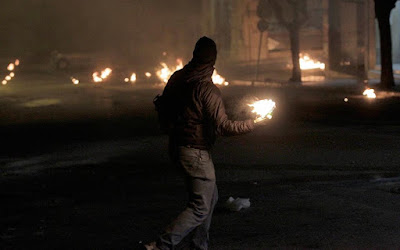I've been working all day yesterday except for a short walk to Staples for printing. But the impression I have is of an overwhelming sense of complacency, where consumers pay nosebleed prices for extremely low quality. Part of this is location: I'm on Central Park South and the tourist hordes are unabated. But as we teeter on the edge of the next financial crash, I wonder how long this sense of entitlement will last.
I posted this on Facebook this morning and was suitably challenged by my Facebook friends to explain myself. Here's my take in more detail.
Some points as to why I believe the markets
are close to crashing (again):
1.
The commodities supercycle has
ended, or at least gone into reverse. Most commodities have seen a 50% price
decline (or more) over the past 12-18 months. Declining commodity prices are a
signal of industrial demand contraction.
2.
Shipping indices (BDI) have
been following them down. I sideline oil tankers, which are being used to store
crude (contagno) as opposed to actively transport it.
3.
Brent hit $ 37.78 today. Low
energy prices are wreaking havoc. GCC sovereign wealth funds are starting to
pull investments in hedge funds, PE funds and everywhere else. Saudi Arabia is
forecast to have a deficit of 15% this year, if not more.
4.
The oversupply of hydrocarbons
and anaemic industrial demand mean that energy prices are set to remain low
going into the future.
5.
Given the high leverage of most
households and companies, I don’t see this translating into a great consumption
stimulus.
6.
Only 3 US companies retain AAA
credit rating status, if I have my information correct. More US companies are
being downgraded than are upgraded.
7.
Equity valuations are now
overvalued again, in nearly every OECD market, and certainly in the US.
8.
Too much of GDP in key markets
remains propped up by property and other bubble-type expenditure (e.g. property
prices in the UK and Germany).
9.
China will be hit by the
negative impacts of over-investment for years to come. This means yet more
price dumping in everything from solar panels and ceramic tiles to clothing,
ICT components and everything else. This means some better times for consumers,
but it primarily means worse times for western manufacturers.
10. The US is set to end QE and start raising interest rates. The ECB is
maintaining or expanding QE. As the US raises interest rates, money will theoretically
see allocation adjustments out of equities into Treasuries and bonds. This is
very theoretical. In fact, I believe that the pricing incentive or price signal
in most portfolios and markets has now effectively been destroyed by central
bank activity and an oversupply of funding chasing too few real equity or
property investment opportunities for alpha returns.
11. I also believe that the monetisation of pension funds is a major
factor in the oversupply of investment funds, or the mismatch of funds chasing
too few opportunities for alpha returns. Ditto algorithmic trading. As a
result, I am no longer certain equity prices are a real signal of corporate
performance, at least not in most OECD markets.
12. So even without raising Fed rates, I’m not sure how much further
current equity valuations can last. I believe we have departed from any real
fundamentals in most cases. In certain categories, like tech start-ups, we are
at the Web 2.0 crash point (similar to Web 1.0 in 1999-2000). Value is being
destroyed, not created.
13. Emerging market growth is now very high risk and does not have the
capability to offset the core problem of a decaying “developed market”
consumer-driven economy. Too much BRIC growth was predicated on the commodities
supercycle. Now, Brazil, China, Russia and later Australia, Canada and other
supplier countries will start to feel the pain. Particularly in those countries
like Canada and Australia that allowed a property bubble to develop on the back
of commodity export-led growth.
14. In too many countries, middle class disposable income has shrank on
absolute terms, either due to wage stagnation, or due to high inflation in core
spending categories (such as property) or due to predatory taxation by
governments. Without a strong middle class, most GDP models don’t work. Most
GDP models are based on about 70% household / consumer spending. The great
crime of Central Banks and Ministries of Finance in most OECD countries is that
they are not accurately measuring property, retail or catering costs accurately
in their core inflation index, deliberately obscuring higher costs in the
typical household basket of goods. Low inflation = low wage growth = low
interest rates in the name of “economic stimulus”. Only it's not stimulus
anymore, its something more akin to “voodoo economics”.
15. Most OECD countries are dividing into a highly protected, permanent workforce
with lots of benefits, versus an at-risk temporary workforce or contract
workforce with no benefits. In most OECD countries, minimum wage is equivalent
to wage slavery. In most OECD countries, young people starting their careers
have no hope of getting onto the property ladder or even earning a living wage
if they live in their national capitals. This is a form of inequality apartheid
which kills motivation and penalises those who invest in their own education
and play by the book.
16. Mega mergers are occurring again. This is a sure sign of high
leverage chasing artificial returns. Most mergers destroy value.
17. Finally, I see massive complacency everywhere. In the public sector.
In the private sector. In the school system and higher education. In
healthcare. In public security. In retail. Everywhere. Far too many people have
become far too comfortable doing very little yet charging a premium for it. How
long can this continue?
(c) Philip Ammerman, 2015


